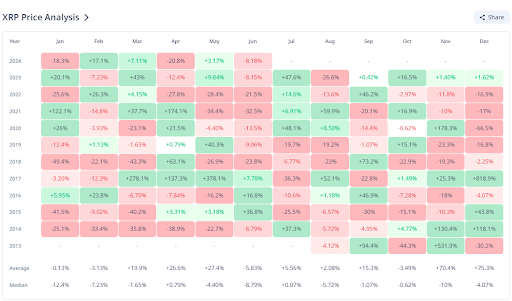XRP is undoubtedly home to more whale addresses than many would expect, with supply data even showing an interesting concentration among these whale wallets. An XRP proponent named Chad Steingraber recently highlighted this phenomenon on social media. According to the supply distribution, XRP is on track to develop a supply crunch in the near future, especially with the SEC lawsuit against Ripple now coming to a close.
Increase In XRP Whales Raise Scarcity Concerns
XRP was created with a total circulating supply of 100 billion XRP tokens. However, despite this huge amount of tokens that could theoretically be available, XRP has managed to be scarce. This interesting distinction was recently highlighted by Steingraber, who noted that the public supply today is far less than people realize.
Part of XRP’s scarcity is due to Ripple’s control over the majority of the supply through an escrow system that releases only a small portion each month. Particularly, this escrow system is known to contain around 40 billion XRP tokens which are currently locked out from the public supply. This controlled supply model has created an artificially limited circulating supply. As demand drastically outpaces this limited supply being released, it’s putting intense buying pressure on the limited XRP available on exchanges.
Aside from the 39 billion or so XRP tokens in escrow, XRP’s availability for retail traders has been threatened by whale accumulation in recent months. Out of the 55.6 billion XRP currently in circulation, the top 10 XRP addresses control about 11.2 billion XRP. Furthermore, the top 50 addresses control 26.9 billion XRP, almost half of the current supply.
The #XRP public supply today is far less than people realize. You will never see 100Billion on the open market.
It will vaporize into a small scarce amount.
Retail trading determines the price. https://t.co/BBWpJeSljl pic.twitter.com/m8BBirjJd3
— Chad Steingraber (@ChadSteingraber) June 22, 2024
For comparison, the top 103 Bitcoin addresses own less than 16% of the total circulating supply of Bitcoin. This discrepancy is even more glaring if the maximum supply of both cryptocurrencies is compared. This supply-and-demand imbalance is the perfect recipe for XRP whales to continue to dominate the circulating supply.
What Does This Mean For XRP?
The concentration of XRP in the hands of fewer holders could drive up prices dramatically if the whales decide not to sell. While increased scarcity might seem concerning for new retail traders trying to buy XRP, it also signals strong confidence in XRP’s future price action. As Steingraber noted, retail trading determines the price, meaning an increase in demand from retail traders will eventually translate to an increase in price.
At the time of writing, XRP is trading at $0.4759, down by 6.28% in the past seven days. Interestingly, this decline seems to have consolidated in the past 24 hours. The bulls are showing activity near $0.4620, setting the stage for an interesting price action in July. According to price history data from CryptoRank, XRP’s price action in July has been positive for the past four years.
In July 2023, XRP witnessed a 47.6% price increase after dropping by 8.15% in June 2023. Current price action shows XRP is on a similar 8.18% decline in June 2024. If history were to repeat itself, a similar surge would see XRP ending July around $0.70.
Bitcoinist.comRead More


